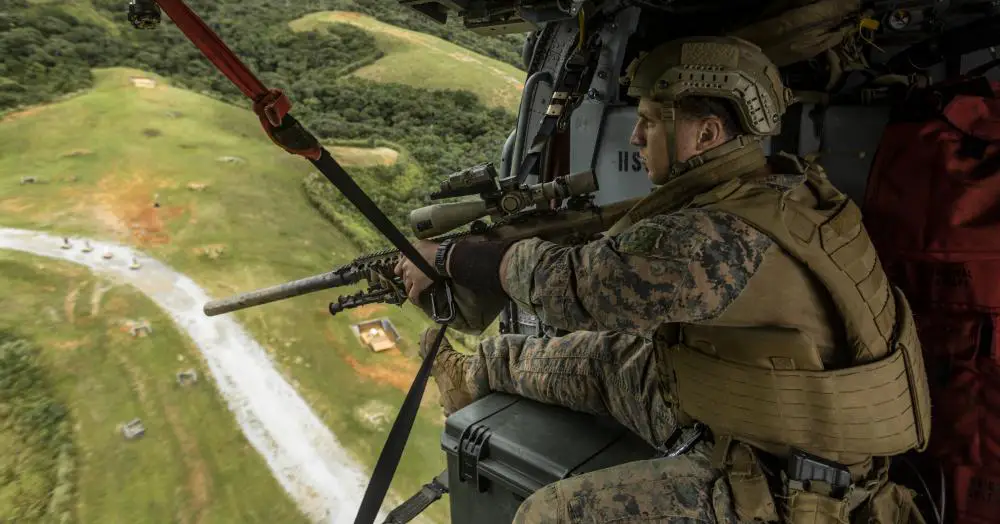Eight U.S. Marine Corps scout snipers conducted aerial sniper training during the 22.2 iteration of the Urban Sniper Course at Camp Schwab on June 15. After completing the training and graduating from the course, the Marines will be certified to conduct aerial sniping for future missions, exercises, and training events. The snipers, armed with M110 Semi-Automatic Sniper Systems waited for a U.S. Navy Sikorsky SH-60 Seahawk Helicopter to arrive. Once the aircraft arrived, the snipers boarded in pairs followed by an instructor who oversaw the training. The aerial sniper training was led by Marines and military contractors with the Expeditionary Operations Training Group to enhance participating Marines’ skills in urban environments through precision fire and engaging targets from an aircraft.

Gunnery Sgt. Augusto Zapata, the chief instructor of Expeditionary Operations Training Group, III Marine Expeditionary Force explained that the Marines gained familiarization with the aircraft, and what they need to be able to do as aerial combatants. He said,” The training provided the students an opportunity to utilize all the marksmanship techniques they have learned in this course while engaging static and moving targets on an aircraft. The 31st MEU deems its aerial sniping capabilities as a critical element of the Maritime Raid Force. It allows us to complete mission essential tasks within a specific mission set.”

“Practicing marksmanship from a helicopter helped me become extremely accurate in an environment other than the ground. I engaged targets while positioning myself in a stable marksmanship position as the aircraft hovered, turned, and approached targets at an angle. This training increased our capabilities as snipers in support of the 31st Marine Expeditionary Unit. I know the training I received will help me save lives and protect this country. I look forward to taking the skills I have learned during this training and passing it to other Marines continuing our mission as snipers,” said Sgt. Todd Smith Jr., a rifleman with 3rd Battalion, 2nd Marine Regiment, 2nd Marine Division.

Once inside, the Marines set a stabilization frame with ratchet straps in the hatch of the aircraft. The Marines then signaled the pilots to take off and fly at varying altitudes towards eight life sized moving targets. While flying to the target, the snipers worked in a two-man team consisting of a spotter and a shooter. The spotter would sit directly behind the shooter placing a hand on his shoulder motioning towards the targets, and then tap the shooter when he had a confirmed hit. The shooter would sit in front of the spotter, near the entrance, shooting in a kneeling firing position. As the aircraft would sway in all direction, the shooter would adjust his position accordingly, placing their reticle on the kill zone of the simulated enemy. A scout snipers’ mission involves gathering information for intelligence purposes by denying enemy advancement by targeting hostile leaders, weapon systems, and forward or counterintelligence personnel. These Marines also conduct close reconnaissance and surveillance operations for the infantry battalion in support of unit operations.
















